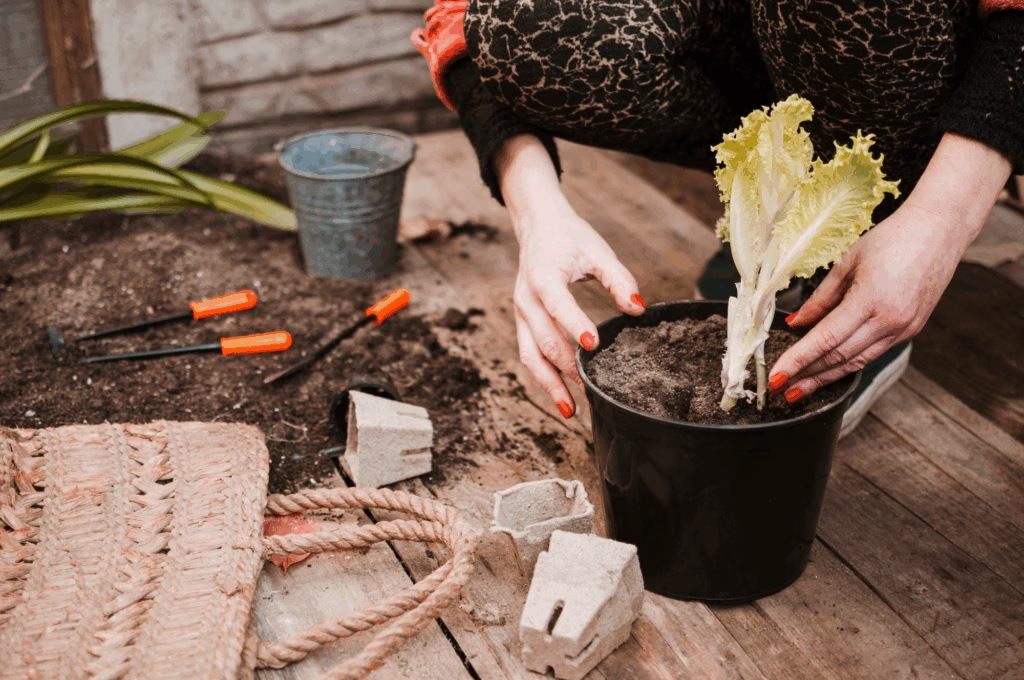Introduction
Organic gardening is about growing plants without synthetic chemicals, focusing on natural fertilizers, soil health, and eco-friendly practices. It’s healthier for you, your plants, and the environment. For beginners, starting an organic garden may seem daunting, but with simple, practical tips, anyone can grow vibrant vegetables, herbs, and flowers sustainably.

This guide highlights five easy organic gardening tips that save time, reduce stress, and improve yields while keeping your garden chemical-free.
1. Improve Soil Naturally
Healthy soil is the foundation of any successful garden. Organic gardeners focus on soil enrichment rather than chemical fertilizers.
Tips to enhance soil naturally:
- Compost: Use kitchen scraps like vegetable peels, coffee grounds, and eggshells to create nutrient-rich compost.
- Green manure: Plant cover crops like clover or alfalfa to fix nitrogen and improve soil structure.
- Mulching: Apply organic mulch (straw, shredded leaves, or grass clippings) to retain moisture, suppress weeds, and regulate soil temperature.
Why it works: Healthy soil promotes strong root growth, increases nutrient availability, and supports beneficial microbes.
2. Use Organic Fertilizers
Organic fertilizers provide nutrients without harming the ecosystem. Unlike synthetic chemicals, they release nutrients slowly, improving soil health over time.
Popular organic fertilizers:
- Compost and compost tea – Improves soil texture and fertility.
- Bone meal – Provides phosphorus for strong roots and flowers.
- Blood meal – Supplies nitrogen for leafy growth.
- Fish emulsion – Fast-acting liquid fertilizer rich in nutrients.
Tip: Apply fertilizers according to plant needs and growth stage. Over-fertilizing can harm plants and soil.
Related: Learn more in our organic fertilizer guide.
3. Encourage Beneficial Insects
Insects are an essential part of organic gardening. While some insects are pests, others help pollinate plants or control harmful pests naturally.
Ways to attract beneficial insects:
- Plant marigolds, dill, fennel, or alyssum to attract ladybugs, lacewings, and hoverflies.
- Avoid broad-spectrum chemical sprays that kill both pests and helpful insects.
- Provide water and shelter areas for insects in your garden.
Why it works: Beneficial insects reduce pest populations naturally, helping your plants grow stronger without chemical interventions.
4. Practice Companion Planting
Companion planting is a technique where certain plants grow well together, providing mutual benefits like pest control, better growth, or improved flavor.
Examples of companion planting:
- Basil and tomatoes – Improves tomato flavor and repels aphids.
- Carrots and onions – Onions deter carrot flies.
- Marigolds with vegetables – Repel nematodes and other pests.
- Cucumbers and radishes – Radishes deter cucumber beetles.
Tip: Group plants with similar water and sunlight needs for efficient care. Companion planting reduces the need for chemical pest control and enhances natural garden productivity.
5. Water Wisely and Sustainably
Proper watering is essential for plant health, especially in organic gardens where synthetic fertilizers aren’t used.
Watering tips for organic gardens:
- Deep and infrequent watering: Encourages strong root growth and reduces water waste.
- Drip irrigation or soaker hoses: Efficiently deliver water to the soil without wetting foliage.
- Mulch: Retains moisture and reduces evaporation.
- Rainwater harvesting: Collect rainwater to reduce reliance on municipal water.
Hack: Early morning watering reduces evaporation and prevents fungal diseases.
Bonus Tip: Rotate Crops and Practice Seasonal Planting
While not one of the main five, crop rotation is a key organic gardening strategy:
- Rotate vegetables like tomatoes, beans, and leafy greens each season to prevent nutrient depletion and reduce pests.
- Seasonal planting ensures plants grow in optimal conditions, reducing stress and increasing yields.
Related: Explore organic vegetable gardening tips.
Benefits of Organic Gardening
- Healthier produce: Free from synthetic chemicals and pesticides.
- Environmental sustainability: Promotes biodiversity and reduces chemical runoff.
- Better soil structure: Encourages natural fertility and beneficial microbes.
- Cost-effective: Reduces the need for chemical fertilizers and pesticides.
By following these five easy organic gardening tips, beginners can start small, sustainable gardens with minimal stress and maximum results.
Conclusion
Organic gardening is not just a trend—it’s a sustainable way to grow healthy, flavorful plants while protecting the environment. By improving soil naturally, using organic fertilizers, encouraging beneficial insects, practicing companion planting, and watering wisely, anyone can maintain a productive and low-stress garden.
Call to Action: Ready to start your organic garden? Visit Agzora.com for premium organic seeds, eco-friendly fertilizers, and expert tips to help you grow healthy, thriving plants naturally.






